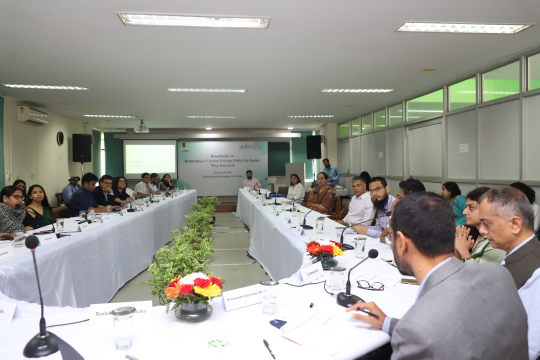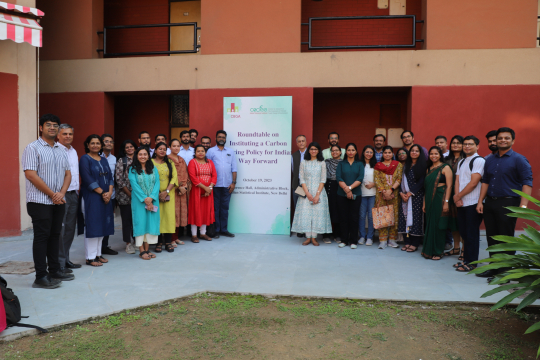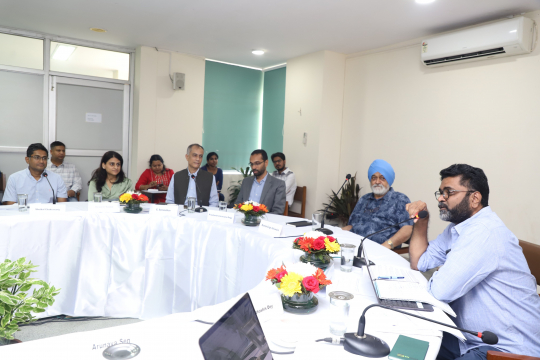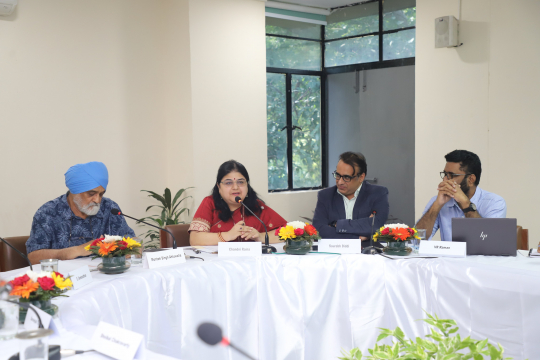A roundtable debated the role of carbon pricing in India’s climate change mitigation strategy, particularly in attaining the national target of net zero emissions by 2070, declared at COP-26. The panelists discussed the role of taxes vs. emission trading systems (ETS) in balancing sustainable long-run growth with a transition to clean energy for India.
The first panel discussion, chaired by V. R. Raman from the Centre for Budget and Governance Accountability (CBGA), focused on the role of carbon policy in India’s climate policy. The panel comprised Prashanth Regy (National Institution for Transforming India Aayog, the Government’s nodal public policy think tank, NITI Aayog), Suranjali Tandon (National Institute of Public Finance and Policy, NIPFP), and Shubhashis Dey (Shakti Foundation).
Carbon prices and taxes on coal were deemed important instruments to meet India’s net zero target, and to enable the correct price signals for investments in renewable energy. Accounting for the social and environmental costs of coal use relative to renewables (including intermittency of renewables and costs of battery storage), the panelists claimed renewable energy is cost-competitive with coal and further investments in coal would be uneconomical.[i]
Need to enhance the framework for clean technology
Despite the introduction of a coal tax through the National Clean Energy Cess in 2010, currently set at INR 400 per tonne of coal (USD 5 per tonne), the real value of the existing coal tax has diminished over the years due to inflation. The panel recommended strengthening the existing coal tax to incentivize investments in renewable energy.
Regarding India’s expansion of renewable energy, the panelists highlighted the necessity for robust frameworks to facilitate international cooperation on technology transfer. Academics also emphasized the importance of protecting intellectual property rights for the development of clean technology, particularly within India. The panelists highlighted the inadequacy of existing legal and institutional frameworks to implement research and development subsidies for clean technologies in India.
Carbon pricing may be “challenging”
The second panel, chaired by E. Somanathan focused on designing an inclusive carbon pricing policy. The panel comprised Montek Singh Ahluwalia (Centre for Social & Economic Progress, CSEP), Saurabh Diddi (Bureau of Energy Efficiency), Chandni Raina (Ministry of Finance), and Shoibal Chakravarty (Indian Institute of Science).
Government representatives, particularly from the Ministry of Finance and the NITI Aayog, expressed concerns about implementing carbon pricing, citing political challenges, and potential negative impacts on the competitiveness of Indian industry and employment in the manufacturing sector. This concern was heightened in the context of the European Union’s Carbon Border Adjustment Mechanism (CBAM), scheduled for implementation in 2026.
Government initiatives and the way forward
In this respect, the Government of India launched the Carbon Credit Trading Scheme via The Energy Conservation (Amendment) Bill, 2022 which was recently enacted in Parliament and is scheduled for implementation in 2026.[ii] The scheme, covering sectors such as steel, aluminum, and chemicals, will implement permit trading monitored by the Bureau of Energy Efficiency, Government of India. The scheme also introduces standards for the minimum use of renewable energy in industrial production and a building code to promote energy efficiency. The scheme draws on experiences from India’s Perform, Achieve, and Trade (PAT) scheme, which aimed at enhancing energy efficiency. A representative from the Bureau of Energy Efficiency discussed the possible expansion of India’s CCTS program to include carbon offsets, after the recent launch of India’s Green Credit Programme (GCP), aimed at enhancing afforestation, and a possible link between the CCTS and the GCP programs in the future.
Need for further research
The roundtable emphasized the importance of conducting further research on the potential impacts of carbon pricing in India, particularly in the context of the EU CBAM. In this respect, the CECFEE team presented preliminary findings from a Computable General Equilibrium model (CGE) developed to assess carbon prices' effects on the Indian economy. Additionally, an incidence tool, to analyze the effect of carbon prices on households’ welfare including revenue recycling options, developed by MCC Berlin, a partner of the EfD Emissions Pricing for Development (EPfD) Collaborative Program, was also briefly discussed at the workshop.
[i] These insights draw on research published by the CECFEE team: Chakravarty, S. and Somanathan, E. (2021). There is no economic case for new coal plants in India: World Development Perspectives, Volume 24, December 2021, 100373.
[ii] PRS Legislative Research. (2022). “The Energy Conservation (Amendment) Bill, 2022.” Summary available here: https://prsindia.org/billtrack/the-energy-conservation-amendment-bill-2022



